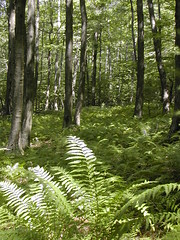 I try to be ecologically friendly. I own a 3 cylinder, 1.0 L car that averages about 40 mpg. Last year, I signed up for the more pricey Clean Energy option with my electricity supplier (this is really gonna bite when the 50% electric rate hike takes effect over this year).
I try to be ecologically friendly. I own a 3 cylinder, 1.0 L car that averages about 40 mpg. Last year, I signed up for the more pricey Clean Energy option with my electricity supplier (this is really gonna bite when the 50% electric rate hike takes effect over this year).I'm sure I could do more; but I try to be aware of my behavior and ameliorate the damage I'm doing. I'm flying from JFK to Geneva this February, and I don't want to feel like I'm destroying my world to do so. So I took a look at the carbon footprint for the flight using this handy flight emissions calculator, which tells me "Your emissions from this flight are: 1.73 Tonnes of CO_2".
I'm doubtful about what carbon footprint calculators really calculate, and whether or not the whole carbon offset concept makes sense at all. The people at Carbon Footprint say: "we believe reduction in household, office, transportation and industrial carbon emissions is far more beneficial in the battle against climate change and has a greater environmental impact than carbon offsetting." That strikes me as a very commonsense approach. After all, if we continue to belch out emissions at the current rate, will it ever be possible to plant enough trees to cancel it all out?
Still, planting a few trees or investing in alternative energies seems like a positive action to take, better than doing nothing. I took a look at a few environmental organizations coughed up by Charity Navigator. The Pachamama Alliance has a great score (4 stars) and piqued my interest, but their site is so vague about what they have actually done that I crossed them out. At the moment, I'm leaning towards Conservation International. They've got 4 stars too, and they've got numerous details on their web site explaining what they do. Here's an example of how they are working to prevent climate change:
With offset donations of various companies, however, CI and its partners are supporting Malagasy communities in managing a protected area and transforming slash-and-burn farming into sustainable agriculture across some 864,900 acres of land.
Sounds good; I think I'll send some money their way.
6 comments:
If it isn't to late, could I make a pitch for our own very small scale attempt to make a difference. For some time we have been growing ash saplings from native seed and putting in a few each year as coppice. This will be selectively coppiced (manually) for firewood every 10-15 years which sounds destructive but actually gives the advantage of the tree having multiple “lives” with minimal disturbance to the new habitat that has been created. On an economic front the harvest of carbon neutral firewood provides the economic reason for managing the new woodland thereafter.
This season we decided to open up the opportunity for the general public to participate, primarily to cover some of the surprisingly sizeable costs of getting trees established (tree guards, fencing, weeding etc).
Knowing that you have your own real tree growing which would not be there unless you had taken action is, I feel, a bit more tangible than a general contribution to the upkeep of existing woodland which is what most of the big schemes boil down to being.
If you are interested, please see http://www.carbonneutralfuel.co.uk/carbon_offset.html. Best Regards, Mark
I'll throw in another late pitch for another way to reduce your carbon footprint - replacing animal products in your diet with plant-based foods, eating lower on the foodchain, as they say.
Check out http://www.pbjcampaign.org for more on how to help the environment one meal at a time.
Mark - I've already made my contribution to Conservation International. I would find it difficult contributing to your suggested organization since there's no way for me to verify the veracity of its claims...
Bernard - I agree in principle, although I am not fond of PBJ sandwiches, having eaten one too many as a child. I am not convinced that everyone must adopt a vegan lifestyle to "save the planet", however.
I'm not a vegetarian, but I don't eat a lot of meat for a variety of reasons. The problem with the suggestions on your site is that you don't discuss healthy alternatives to eating animal-based products. For example, we are urged to eat fish several times a week to get omega-3 fatty acids for heart health, and to eat dairy for calcium. If we replace fish and dairy with supplements, then you have to compare how large a carbon footprint supplements have.
There are good sources of calcium in the vegan diet but I'm not clear on whether it's possible to get sufficient omega-3s without eating fish.
Check out this US Carbon Footprint Map, an interactive United States Carbon Footprint Map, illustrating Greenest States & Cities. This site has all sorts of stats on individual State & City energy consumptions, demographics and State energy offices, State Taxes and more down to the local US City level...
http://www.eredux.com/states/
eredux -
At the moment, your site does not seem to cite the source of your statistics. You should really add this info, or if it's there, make it much more visible.
Post a Comment